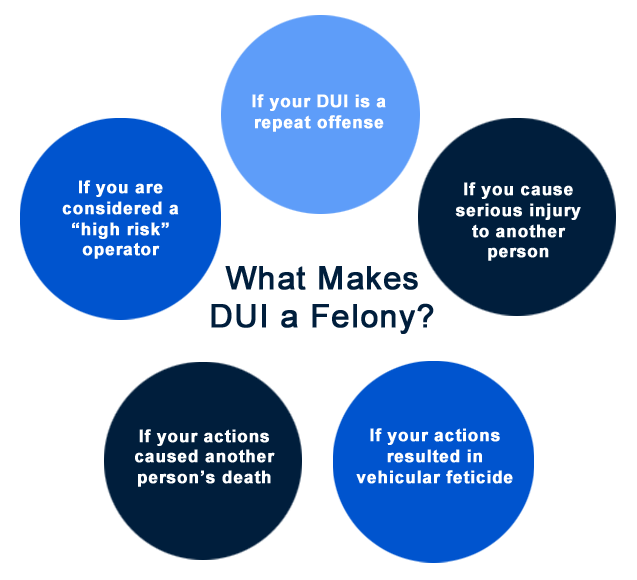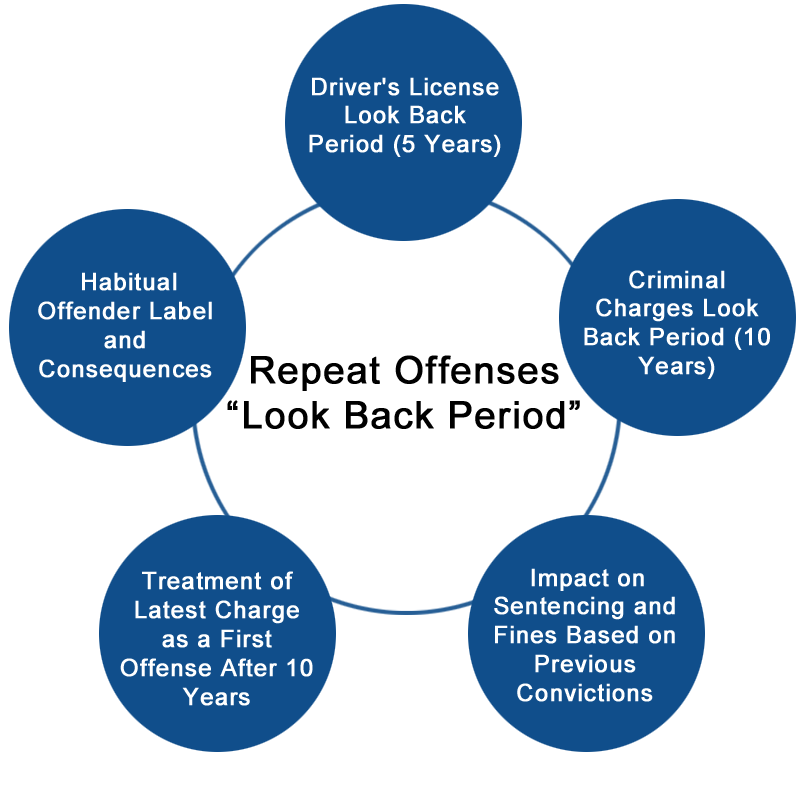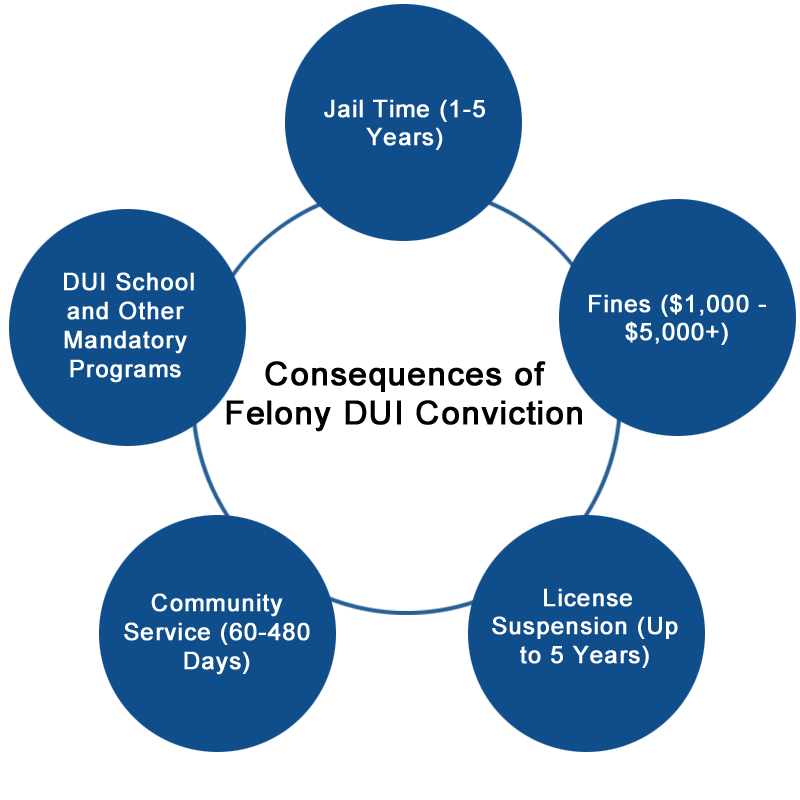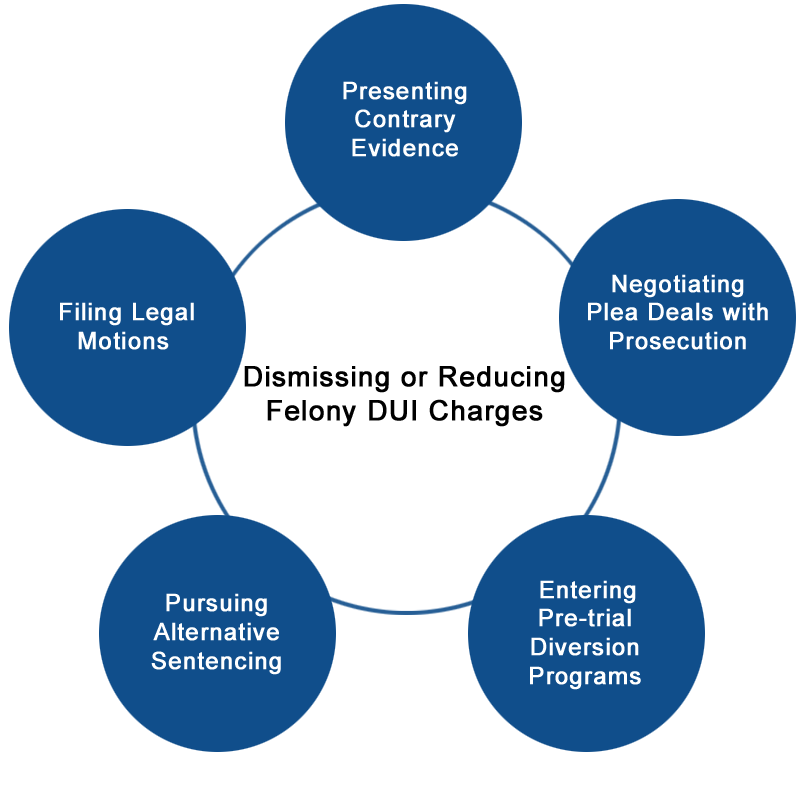
DUI Felony in Georgia
When facing a DUI charge in the state of Georgia it is of the utmost importance that you prepare yourself with a strong defense. If you are convicted, or if you plead guilty, you can face significant fines, penalties and jail time, not to mention a permanent mark on your criminal record.
There are several ways in which you can be convicted of a DUI, with the severity of the charges being based on the nature of your arrest.
DUI Misdemeanor: Although this is the least of the possible DUI charges, it still carries substantial penalties including up to a year in local or county jail and fines of up $1,000 or more.

DUI Misdemeanor of a High and Aggravated Nature: Under specific circumstances, the prosecution may choose to upgrade to high and aggravated charges. In cases that represent the third DUI for the same individual within a ten-year period, this upgrade is automatic. Penalties can include up to a year in jail with a minimum 15-day sentence as well as fines up to $5,000.
Felony DUI: The most severe possible DUI charge you can face in Georgia, felony DUI usually leads to a sentence of more than a year of federal prison time and much higher fines. A fourth DUI within the span of 10 years will automatically be treated as felony DUI, but there are several other factors that could lead to a felony charge.
Circumstances that can Lead to Felony DUI
Apart from a fourth such charge within the span of 10 years –known as a “habitual violator offense” – various circumstances can lead to a felony DUI charge. In addition, several can lead to their own separate charges which carry their own penalties.
Serious Injury by Vehicle: When one person injures another while operating a vehicle in violation of traffic laws, the state of Georgia considers this Serious Injury by Vehicle. The injuries to the other person must be substantial to trigger such a charge, ranging from broken bones and disfigurement to permanent brain injury. A Serious Injury by Vehicle charge carries a prison sentence between 1-15 years.
Vehicular Homicide: When reckless or intoxicated driving results in the death of another person, prosecutors can charge the driver with felony-grade Vehicular Homicide, with convictions that can result in up to a 15-year prison sentence. As with Serious Injury by Vehicle, a Vehicular Homicide automatically makes the associated DUI charge a felony.
Hit and Run: Otherwise known as “leaving the scene of an accident,” this occurs when a driver is involved in an accident while driving under the influence but fails to stop and provide assistance or information to the other party. While not automatic, a hit and run greatly increases the chances of a DUI being prosecuted as a felony.


Child Endangerment: If a driver is found to be intoxicated, and has a passenger aged 14 or under in the vehicle at the time, they can be charged with child endangerment. The child’s presence alone puts them at extraordinary risk, and if the child is harmed it only increases the chances of the associated DUI being charged as a felony, carrying jail time up to 5 years and fines of $10,000 or more.
Elevated BAC: A DUI charge comes when a driver is found to have a blood alcohol content (BAC) of .08% or greater. Once that BAC reaches a certain threshold, generally 0.15%, the driver can be charged with a felony DUI, particularly if this is not their first offense.
License Violations: Those found to be driving under the influence while operating a motor vehicle without a license (either through suspension or revocation) can face felony DUI charges, particularly if this is a second or subsequent DUI.
Call (912) 351-8775 or Schedule a Free Case Evaluation Online
 Repeat Offenses and the “Look Back Period”
Repeat Offenses and the “Look Back Period”
While a DUI conviction doesn’t ever fall off of the offender’s permanent record, there is a span of time after which previous convictions are not considered as part of sentencing. Known as the “look back period,” this span begins when a person is convicted of DUI. In the state of Georgia, there are two different look back periods associated with DUI charges, as DUI essentially carries two charges.
The first is the charge against the driver’s license, determining the length of suspension or the possibility of revocation. In determining whether to suspend or revoke, the state can only look back through the last 5 years of a driver’s history. With the second aspect of a DUI, associated criminal charges, the state can review the last 10 years.
Essentially, this means that in a case where a driver was being charged with a DUI six years after being convicted for the first time, the state would consider the previous conviction in determining jail time and fines. They would not, however, consider the previous conviction in determining whether to suspend or revoke the driver’s license.
Conversely, if a driver receives a DUI after having previously been convicted more than 10 years ago, the latest charge would still be treated as a first offense. Otherwise, with three or more offenses they could be labeled a “Habitual Offender” by the state of Georgia, a legal term that carries tremendous consequences for driving privileges.
 Consequences of Felony DUI Conviction
Consequences of Felony DUI Conviction
A conviction for felony DUI carries a host of consequences, both direct and indirect, that can follow a person throughout the rest of their lives. A few of these include:
Jail Time: Between one and five years in federal prison.
Fines: Penalties that range between $1,000 – $5,000, and potentially higher.
License Suspension: For a fourth DUI conviction, the state can revoke a driver’s license for up to five years.
Community Service: Anywhere from 60-480 days of mandatory service.
DUI School: Mandatory risk reduction program that must be fully completed.
Probation: Following prison time, this probationary period can include regular testing for drugs and alcohol, plus check-ins with a parole officer.
Installation of an Ignition Interlock Device (IID): Once driving privileges have been reinstated, the court may still require the driver to install an IID, preventing them from driving if they fail to register a BAC of 0.0%.
Victim Impact Panel: A mandatory session in which the driver hears from victims and family members who have lost loved ones to drunk driving.
Restitution: The driver may be required to compensate those they’ve harmed for any medical expenses or property damage they caused.
In addition to these consequences, those charged with felony DUI can expect to face challenges securing employment due to their status as a felon. They may also find themselves paying much higher premiums for automobile insurance. This is on top of the indirect long-term consequences that come from a felony conviction – loss of voting or second amendment rights, difficulty finding housing or educational opportunities, loss of income, and the social stigma of being a criminal.
 Dismissing or Reducing Felony DUI Charges
Dismissing or Reducing Felony DUI Charges
Under Georgia law, there are circumstances under which a felony DUI charge can be dismissed outright or reduced to a misdemeanor. While a dismissal would be the ideal, even a reduction to misdemeanor charges would help avoid the long-term implications that come with a felony charge, impacting the rest of their lives.
There are a wealth of legal avenues to pursue in reducing or dismissing felony DUI charges, whether that entails presenting contrary evidence, negotiating a plea deal with prosecution, entering into pre-trial diversion programs, pursuing alternative sentencing, or filing legal motions.
The Claiborne Firm employs a philosophy of meticulous preparation in providing clients with vigorous defense against felony DUI charges. Our attorneys are relentless in pursuing every detail about a DUI case, creating a profound knowledge of the case that gives them an edge over the prosecution. There are many inexperienced attorneys out there offering budget-priced representation, but their track record reflects that lack of experience.
When you’re facing felony DUI charges, it’s vital that you put your freedom in the hands of attorneys who know how to win cases just like yours. Your future may very well depend on their experience and insight. To see what a difference Claiborne’s meticulous process can make in a DUI case, call (912) 351-8775 today to schedule a free, no-obligation consultation.





